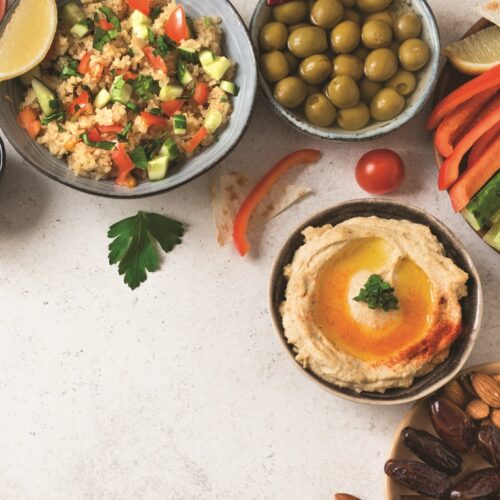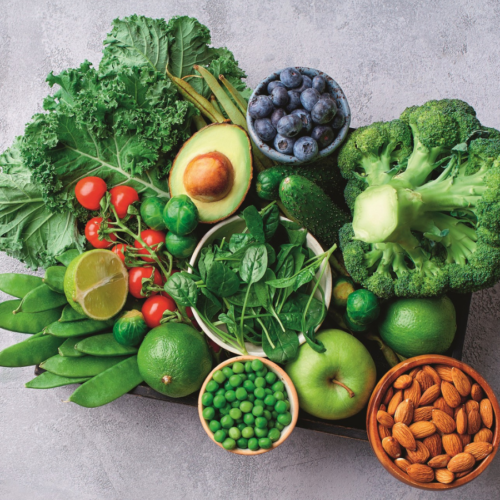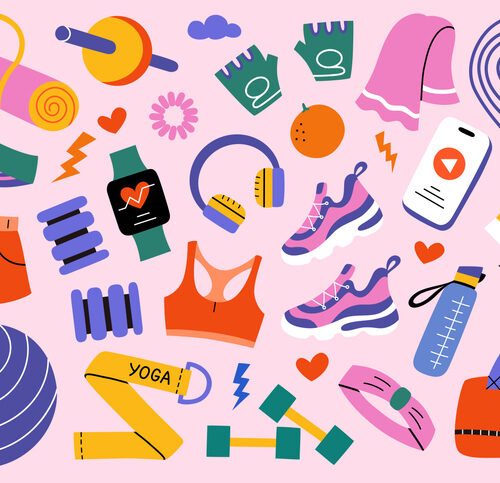
Is there anything more life-changing than caring for a new baby? First-time mum and HFG nutritionist Claire Turnbull shares her ideas for looking after yourself during this exciting but challenging time.
Now I understand why people kept telling me that when you become a mother, life will never be the same. It’s amazing how quickly your world changes and how all your healthy habits can go out the window in a flash.
Despite the challenges, it’s important to eat well and look after yourself because it can make all the difference to how well you cope. Here are ideas to help you face some of the challenges.
Help! My routine is up the wall
When your baby arrives and you’re feeding around the clock, the days and nights all seem to merge. The old ‘breakfast, lunch and dinner’ routine can disappear and it can be easy to snack and pick at food all day long without ever eating anything nourishing. Try these ideas:
- In the early days, it can work well to have 4-5 small or ‘mini’ meals a day (see Quick and easy meal ideas below). If you’re up several times in the night feeding, you might need a light snack then too. Try a banana, yoghurt or glass of milk.
- Prepare for the day ahead. Before you go to bed (even if you’re up in the night) collect food you can eat the next day and put it in a box in the fridge. Having everything ready in one place makes life easier the next day.
- Get a water bottle. It’s easy to forget to drink, so aim to fill your bottle two or three times a day, or put a jug in the fridge and try to drink it all. Always have water next to you when feeding your baby.
Quick and easy meal ideas
- Wholegrain cereal with milk
- Low-fat yoghurt with muesli and fresh fruit
- A homemade smoothie (see Nutrition-packed smoothies below for ideas)
- Eggs or beans on toast
- Wholegrain crackers with cottage cheese/tuna/salmon/avocado and tomato
- Soup — ideally with pulses and lots of veges
- An omelette with veges such as spinach, mushrooms and tomatoes
- Two-minute microwave rice with a can of salmon/tuna or a grilled chicken breast with a tomato and handful of baby spinach
- Fresh filled pasta with frozen vegetables
I just can’t get to the supermarket for a weekly shop
With feeding, nap times and endless nappy changes it can sometimes be impossible to get out of the house so the way you shop for food may need to change. The solution will depend on the age and stage of your baby, how much help you have and the proximity of food shops and supermarkets. Here are some things you can try:
- Shop online. Set up a weekly order for the basics. If you haven’t had your baby yet, set up your online list so it’s ready when the little one arrives.
- Buy in bulk and top up. Make a two-week shopping list and ask your partner/parents/in laws/a friend to go to the supermarket and do a big shop for the basics (cans of tomatoes, frozen veges, rice etc) to last 2-3 weeks. If you live handy to the supermarket or store, take baby for a walk to buy the extras.
When dinner comes around, I can’t be bothered
Boy, do I remember that feeling! I went from being an avid cook to feeling like boiling an egg was a huge effort. Here are some ideas to help you through this time:
- If you haven’t had your baby yet, get cooking! Meals in the freezer can be a lifesaver.
- Accept help. If people offer to help, ask them to make you dinner or bring something around. A healthy meal is a gift like no other.
- Cook dinner every other night. Make double meals and eat them two nights in a row or have leftovers as mini meals the next day.
- Delegate. If you have a partner, set a few nights for them to cook or sort out dinner.
- Use our 5pm panic! meal ideas, and 40 meals in 20 minutes for super-quick and nutritious recipes.
I’m so tired!
Nothing can describe the tiredness you feel after weeks of sleepless nights and what feels like constant feeding. It can be so tempting to reach for the sweet treats to give you an energy boost, but in the long run, it really won’t help. Beat fatigue the healthy way with these tips:
- Get outside. Days can go by before you realise you haven’t stepped outside once. Fresh air and exposing your eyes to light can have a significant impact on your mood and help you sleep better (if and when you get the chance!). Sitting on the doorstep when your baby sleeps or getting out for a walk will help.
- Snack smart. Avoid sugar- laden quick fixes and opt for protein-packed ones that will fill you up (see Quick snacks below).
- Take a nap. Everyone says it, but DO IT. Have a 20 or 30-minute sleep as often as you can. Washing and dishes can wait.
- Ask for help. If someone offers to help, accept it — even if it is just so you can get out for a walk or to nap for 20 minutes. Don’t try to be a superwoman.
Quick snacks
- Unsweetened low-fat yoghurt with chopped banana and seeds on top
- Small handful of unsalted nuts
- Boiled egg
- Can of tuna or salmon on wholegrain crackers
- Cottage cheese or hummus and wholegrain crackers or with chopped apple or pear
- Glass of trim milk and a piece of fruit
My body will never be the same
Pregnancy and breastfeeding certainly change your body but it is possible to get back to a shape and size you are comfortable with — you just need to be patient. I was still wearing maternity jeans when my little boy was four months old and it has taken me about nine months to get back to where I was pre-pregnancy.
- Accept there are some things that are part of the journey of growing a human being! Stretch marks and changes to the chest department fall into that category. Please don’t compare yourself to supermodels who bounce back to their pre-baby shape in a month. They are the exception to the rule.
- Find new ways to keep active that fit into your new routine. Try walking or exercising with your baby whenever you can. You can do squats while you hold them, press-ups with them lying next to you and lift them up and down to strengthen your arms! There are also new mums’ exercise classes. It is a good idea to get clearance from your Lead Maternity Carer (LMC) before you get into anything too full-on. A lot of things can change in your body and you need to make sure you don’t cause yourself any damage.
Breastfeeding is so much harder than I thought!
Some people find breastfeeding a breeze; for others it is a nightmare with problems including low or over-abundant milk supply, difficultly latching on or mastitis. Here are some tips to help:
- Rest and relax. I appreciate that’s easier said than done, but it is still worth saying.
- Get help early. If you are struggling, ask for help. Talking to your midwife, breastfeeding support services such as La Leche League or a specialist lactation consultant can help.
- You aren’t a failure if you use formula. We are, of course, all supportive of breastfeeding, but if you’ve tried everything and it’s just not working, then don’t give yourself a hard time.
- It’s fine to eat nuts and eggs when feeding — current research suggests it won’t increase the risk of your child developing allergies to them.
NOTE: This is general advice, but doesn’t replace advice from your LMC.
Nutrition-packed smoothies
- Power boost: Blend a banana, 1 cup trim milk, 1/2 cup low-fat yoghurt, 1 tablespoon oats, 2 teaspoons seeds (eg sunflower, pumpkin, chia), ground LSA or peanut butter.
- Green berrylicious: Handful of baby spinach, handful of frozen berries, 1 cup trim milk, 1/2 cup low-fat yoghurt and 2 teaspoons ground LSA.
- Chilled-out mama: Frozen banana, 2 dates, 1/4 avocado, 1 tablespoon pumpkin seeds, 2 tablespoons cocoa powder and vanilla extract.
Is your baby getting enough iron?
Amazingly, babies aged 7-12 months need more iron than a fully-grown man (11mg/day for your baby versus 8mg/day for men!). Iron is vital for mental and physical development. Up until six months, most babies have enough stored iron to meet their needs, but beyond this it is vitally important to include iron-rich foods.
As well as the iron your baby gets from breast milk and/or formula, from around six months it’s a good idea to use an iron-fortified baby rice and also, regularly include cooked and pureéd red meat, fish and chicken.
You can also cook liver, freeze it and grate a little into your baby’s pureed veges. Limit it to 10g/2 teaspoons a week as it’s high in vitamin A and too much can be damaging. As your baby moves on to lumpier foods, eggs (mashed, scrambled and, later, as chunks) boost iron. Include vitamin C-rich foods in the same meal to increase iron absorption.
Watch the sodium
It’s important to limit sodium (from salt) as immature organs can easily get overloaded. Don’t add salt to your baby’s food. Be mindful that products such as stock, soy sauce, Marmite and packet mixes can be high in sodium. Babies under 12 months should not have any more sodium than they get from breast milk/formula and food made without added salt.
Postnatal depression
The impact of having a baby can be huge — not only because of what you’ve been through during birth, but also because of fluctuating hormone levels, sleep deprivation and major life changes.
Most women are likely to feel up and down and have several days filled with tears, but an ongoing sense of being overwhelmed, feeling anxious or low in mood, having negative or suicidal thoughts and difficulty concentrating are some of the signs of postnatal depression, which affects 10-15 per cent of mums.
It’s really important to talk about how you are feeling and seek help and support, not only from your friends and family but also from your Plunket nurse or GP. You do not have to struggle by yourself; there are lots of people who understand what you are going through and can help.
Article sources and references
- Australasian Society of Clinical Immunology and Allergy. Infant feeding advice www.allergy.org.au/images/stories/aer/infobulletins/2010pdf/ascia_infant_feeding_advice_2010.pdf Accessed May 2015https://www.google.com/search?q=Australasian+Society+of+Clinical+Immunology+and+Allergy.+Infant+feeding+advice+www.allergy.org.au%2Fimages%2Fstories%2Faer%2Finfobulletins%2F2010pdf%2Fascia_infant_feeding_advice_2010.pdf+Accessed+May+2015&rlz=1C1GCEU_enNZ820NZ820&oq=Australasian+Society+of+Clinical+Immunology+and+Allergy.+Infant+feeding+advice+www.allergy.org.au%2Fimages%2Fstories%2Faer%2Finfobulletins%2F2010pdf%2Fascia_infant_feeding_advice_2010.pdf+Accessed+May+2015&aqs=chrome..69i57.463j0j4&sourceid=chrome&ie=UTF-8
- Australian National Health and Medical Research Council & New Zealand Ministry of Health. 2006. Nutrient Reference Values for Australia and New Zealand including Recommended Dietary Intakes. Canberra: NHMRChttps://www.nhmrc.gov.au/sites/default/files/images/nutrient-refererence-dietary-intakes.pdf
- Ministry of Health. 2006. Food and nutrition guidelines for healthy pregnant and breastfeeding women: A background paper. Wellington: Ministry of Healthhttps://www.health.govt.nz/system/files/documents/publications/food-and-nutrition-guidelines-preg-and-bfeed.pdf
- Ministry of Health. 2008. Food and nutrition guidelines for healthy infants and toddlers (aged 0-2): A background paper. Wellington: Ministry of Health Mothers Matter www.mothersmatter.co.nzhttps://www.health.govt.nz/publication/food-and-nutrition-guidelines-healthy-infants-and-toddlers-aged-0-2-background-paper-partially
- Plunket. Baby’s first foods www.plunket.org.nz/your-child/6-months-to-1-year/food-and-nutrition/babys-first-foods/ Accessed May 2015https://www.plunket.org.nz/your-child/6-months-to-1-year/food-and-nutrition/babys-first-foods/
www.healthyfood.com










